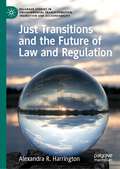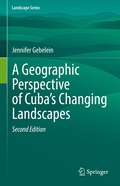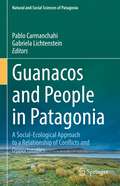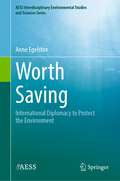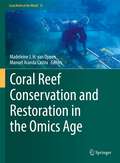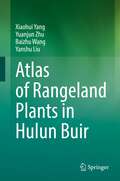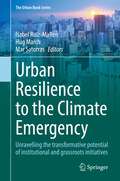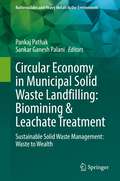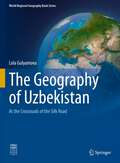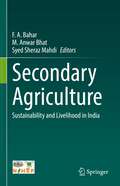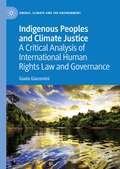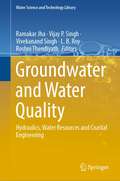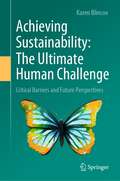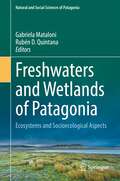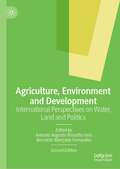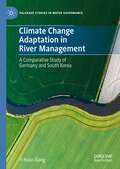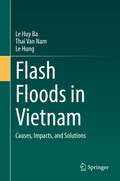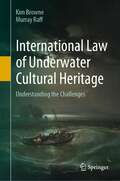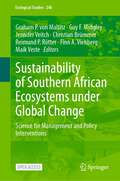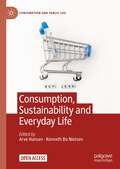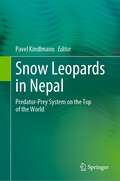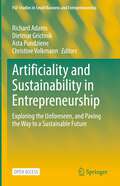- Table View
- List View
Just Transitions and the Future of Law and Regulation (Palgrave Studies in Environmental Transformation, Transition and Accountability)
by Alexandra R. HarringtonThis book provides a comprehensive assessment of how national and international efforts to achieve carbon neutrality have been embraced as necessary to meet the requirements of the Paris Agreement as well as the needs of the planet. The authors explore the increasing tensions between aspirations and entrenched practices as methods to implement carbon neutrality are devised, particularly at the national and sub-national levels. This is perhaps best typified by efforts to shift from “dirty” energy production, such as coal, to greener alternatives, which are often supported in laws and rules but opposed by society. To bridge this void, the concept of just transitions has increasingly come to the forefront of international and national focus yet is often poorly understood. This book examines the ways in which just transitions have been proposed as a legal and regulatory bridge to address issues that result in societal resistance to implementation. It uses past and existing practice studies of just transitions before providing an analysis of how just transitions can be used to not only to assist in the shift to carbon neutrality but also in new shifts such as those caused by the Covid-19 pandemic impacts on economy, environment and society, and to address future global challenges.
A Geographic Perspective of Cuba’s Changing Landscapes (Landscape Series #33)
by Jennifer GebeleinThis book is based on research that gives the reader a nonfiction view of how Cuba’s landscape has changed since the time when Columbus first set foot on the island and encountered the Indigenous peoples who lived there in 1492 to present day.An analysis of landscape change over time is presented and that transformation from a heavily forested island to less than (currently) 18% forest cover is described. The government has established a system of protected areas and strong governmental controls over environmental policies and the manner with which the island can be built upon by foreign investors, urban expansion projects, or natural resource exploitation.Current GIS and remote sensing research of Cuba’s atmosphere, physical landscape and aquatic features is provided to underscore the complex environmental structures that epitomize Cuba. The author discusses past, present and future impact factors including history, technological assessments, laws and policies, relationships with other countries and education.
Guanacos and People in Patagonia: A Social-Ecological Approach to a Relationship of Conflicts and Opportunities (Natural and Social Sciences of Patagonia)
by Gabriela Lichtenstein Pablo CarmanchahiThis book relates one of the most representative species of Patagonian wildlife, the guanaco, to human societies across time, and explores how that relationship has changed over time due to different land uses and productive interests. The book provides information to understand these interactions, and contextualizes the current situation of this species. In some cases, it proposes possible solutions to conflicts, and also shows ongoing activities aimed at sustainable use and conservation. The audience for this book includes researchers, graduate students, policy makers and conservation and rural development professionals. In addition, it will serve as a tool for application authorities and field technicians on the use and conservation of wildlife, to define management actions for this species.
Worth Saving: International Diplomacy to Protect the Environment (AESS Interdisciplinary Environmental Studies and Sciences Series)
by Anne EgelstonThis textbook is intended to be used in an upper-level international environmental issues class as part of the American Environmental Studies and Sciences book series. This class is commonly taught at both the undergraduate and graduate level as part of either an environmental studies program, a political science program, or within a policy track of an environmental science program.Given the length of time that negotiations have occurred, a new generation of students and practitioners will need to understand the complex processes that produced many of our environmental treaties. The majority of the students in environmental studies do not have a background in political science. Moving from a political science approach to an interdisciplinary approach will benefit the students by making the material more accessible.As these fields continue to grow and develop, regulatory compliance becomes increasingly important. Thus, this book is aimed at adding a business and industry perspective to this field where appropriate.
Coral Reef Conservation and Restoration in the Omics Age (Coral Reefs of the World #15)
by Madeleine J. H. van Oppen Manuel Aranda LastraThe rapid demise of coral reefs worldwide has spurred efforts to develop innovative conservation and restoration methods. Many of these rely on omics approaches to produce genetic, genomic, transcriptomic, epigenomic or metabolomic data to inform conservation and restoration interventions. This book provides the state of play of this field. It discusses topics ranging from how genomic and environmental DNA (eDNA) data can be used to inform marine protected area design and cryopreservation strategies, the use of knowledge on adaptive genetic and epigenetic variation to maximise environmental stress tolerance of coral stock, harnessing transcriptome data to develop early warning markers, the use of microbial symbiont omics data in guiding restoration strategies, to applications of metabolomics and genetic engineering. How best to translate omics data to resource managers is also discussed.
Atlas of Rangeland Plants in Hulun Buir
by Xiaohui Yang Yuanjun Zhu Baizhu Wang Yanshu LiuThis book includes description of main morphological characteristics of 435 species (including varieties and subspecies) belonging to 57 families and 233 genera of endemic and endangered plants of Hulun Buir Rangeland in China. A brief description of the morphological characteristics of each plant, flowering period, zoning, habitat, and the usage habits of most plants, together with 1 to 4 photographs taken in the field are provided. This work is designed not only for researchers working in rangeland science, ecological restoration and protection but also for professionals working in rangeland and related fields. The work is a result of many years of rangeland plant collection and specimens identification.
Urban Resilience to the Climate Emergency: Unravelling the transformative potential of institutional and grassroots initiatives (The Urban Book Series)
by Isabel Ruiz-Mallén Hug March Mar SatorrasThis volume sheds light on urban resilience strategies in times of climate emergency and social and economic crisis by reflecting on related social vulnerabilities and inequalities within cities and showing the potential of participatory governance approaches for socio-environmental transformation. The book compiles critical research documenting the articulation of urban resilience strategies dealing with climatic changes, as well as the understanding of the unexpected implications of top-down resilience plans to address the impacts of climate change in cities, especially on the most vulnerable urban populations, and the transformative capacities of bottom-up and socially innovative resilience strategies. The book especially focuses on co-produced and grassroots transformative processes that are concerned with social equity in urban planning for climate change. Although several publications cover the topic of urban resilience, this book provides a more nuanced exploration of urban climate governance and citizen engagement in urban climate resilience policies through the lenses of political ecology, environmental justice and co-production. In this regard, the volume moves beyond the approach of multilevel urban climate governance by critically addressing the unexpected impacts of top-down strategies of urban resilience with the goal of expanding the reflection on citizen engagement. The book also explores the emerging possibilities behind the co-production of urban resilience as well as the critical role of grassroots and citizens in promoting such alternative strategies. While the primary target audience is scholars from different disciplines (e.g. geography, urban studies, planning, political ecology, architecture, urban sociology, environmental studies) focusing on urban resilience, the editors also aim to reach urban resilience practitioners from local, national and international organisations as well as environmental grassroots and climate activists.
Aspects of Brazilian Floristic Diversity: From Botany to Traditional Communities
by Maria Franco Trindade Medeiros Bárbara de Sá HaiadAspects of Brazilian Floristic Diversity: From Botany to Traditional Communities offers a unique approach in floristic diversity of the Neotropical region, specifically encompassing the Brazilian flora. This volume combines both theoretical and applied aspects of scientific making knowledge in different perspectives of Botanical Science. In this volume, botanical specialists discuss the many different approaches of taxonomic, reproductive, ecological and ethnobotanical aspects of Brazilian floristic diversity, thereby enlightening the global interest in Neotropical species, in particular those from the Brazilian territory. The book addresses relevant questions from many points of view, including anatomy, reproduction, palinology, conservation and ethnobotany, creating an in-depth perception of the flora in its complexity constitution.The book provides a comprehensive outlook on Botany Sciences, considering the history and traditional knowledge of plants, and relating it to contemporary problems and concerns of flora conservation today. With this current perspective, this book reaches a vast audience from the research lines of Botany, and encompasses a broader and interdisciplinary understanding of Aspects of Brazilian Floristic Diversity.
Circular Economy in Municipal Solid Waste Landfilling: Sustainable Solid Waste Management: Waste to Wealth (Radionuclides and Heavy Metals in the Environment)
by Pankaj Pathak Sankar Ganesh PalaniThis book will serve as a ready reckoner of contemporary information regarding municipal solid waste landfill biomining, treatment of landfill leachate and heavy metals in a single platform. The academicians, researchers, and students at master’s and doctoral levels will be able to understand the current trends in municipal solid waste landfill operations, which will help in augmenting their research. Construction of new landfills requires huge monetary investments, which can be avoided if old landfills were bio-mined for resources and the space can be re-used as new landfills. Landfill leachate is a hazardous waste which needs proper treatment that could generate value-added products such as clean energy and biofertilizers. In this book, each chapter would provide the background, methodology, and relevant calculations for sustaining landfill operations. Also, the case studies based on best practices in municipal solid waste landfilling are discussed in this book.
The Geography of Uzbekistan: At the Crossroads of the Silk Road (World Regional Geography Book Series)
by Lola GulyamovaThis book describes the geography of Uzbekistan and its unique history and culture. It focuses on the development of Uzbekistan as a result of its location on the crossroads of the Silk Road. The influence of global and regional environmental challenges on the current landscape and similar issues are discussed and analyzed from a historical perspective. Contemporary tensions and reforms in social, economical and cultural life are described with the aim to draw a picture of modern paths to transformation and development. The Geography of Uzbekistan includes also information on geology, nature and natural resources, in particular water. The book discusses the social and environmental impacts of the Aral Sea disaster and shows new paths of transformation and development for this Central Asian country.
Secondary Agriculture: Sustainability and Livelihood in India
by Syed Sheraz Mahdi F. A. Bahar M. Anwar BhatThis book on ‘Secondary Agriculture’ discusses the goal of doubling farmers’ incomes. The term ‘secondary’ has a bearing on climate change adaptation and its mitigation, small farm viability and profitability, food security, nutrition, sustainable utilization of natural resources, and optimal usage of produce from primary agriculture and farm incomes. Promoting secondary agriculture has implications on attaining sustainable development goals, which aim to connect primary, secondary and tertiary sectors by using slack/idle factors of production, such as land and labour, contributing to primary agriculture production, capturing ‘value’ in primary agricultural activities, and generating additional income at the enterprise level. In context to same, the chapters of this book have been designed to promote secondary agriculture through low-cost skills and technology applications in agriculture and by upscaling knowledge via integrating primary, secondary and tertiary sectors of agriculture. The motivation behind this book is to address the challenges of biotic and abiotic stresses facing the farming community; to increase farmers income through low-cost skills and technology applications in agriculture; to upscale knowledge by integrating primary, secondary and tertiary sectors of agriculture. The food processing sector in India is still in a nascent stage with only 8 per cent of the produce being processed as against 80-98 per cent in case of high-income countries (Government of India, 2008, 2010). The food processing sector is now receiving the boost with the annual growth of 13.2 per cent in registered food processing units during 2004-10 (Government of India, 2011). Against this backdrop, there is a strong need to strategically handle the situation in order to facilitate a self-sustainable and long-run growth of the sector, which is felt possible by focusing on Secondary Agriculture. Though not a panacea for all ailments of the primary sector, but it can definitely drive the growth.
Indigenous Peoples and Climate Justice: A Critical Analysis of International Human Rights Law and Governance (Energy, Climate and the Environment)
by Giada GiacominiThis book provides a new interpretation of international law specifically dedicated to Indigenous peoples in the context of a climate justice approach. The book presents a critical analysis of past and current developments at the intersection of human rights and international environmental law and governance. The book suggests new ways forward and demonstrates the need for a paradigmatic shift that would enhance the meaningful participation of Indigenous peoples as fundamental actors in the conservation of biodiversity and in the fight against climate change. The book offers guidance on a number of critical intersecting and interdependent issues at the forefront of climate change law and policy – inside and outside of the UN climate change regime. The author suggests that the adoption of a critical perspective on international law is needed in order to highlight inherent structural and systemic issues of the international law regime which are all issues that ultimately impede the pursue of climate justice for Indigenous peoples.
Groundwater and Water Quality: Hydraulics, Water Resources and Coastal Engineering (Water Science and Technology Library #119)
by Vijay P. Singh Ramakar Jha Vivekanand Singh L. B. Roy Roshni ThendiyathThis book deals with topics of current interest, such as climate change, floods, drought, and hydrological extremes. The impact of climate change on water resources is drawing worldwide attention these days, for water resources in many countries are already stressed and climate change along with burgeoning population, rising standard of living, and increasing demand are adding to the stress. Further, river basins are becoming less resilient to climatic vagaries. Fundamental to addressing these issues is hydrological modelling which is covered in these books. Further, integrated water resources management is vital to ensure water and food security. Integral to the management is groundwater and solute transport. The books encompass tools that will be useful to mitigate the adverse consequences of natural disasters. This book provides many new and innovative methods to assess groundwater and estimate water pollution. Groundwater recharge, solute transport, ground water modelling are some of the important variable used to estimate the groundwater movement, hydraulic gradient and pollution movement. The water quality is another important variable of river Ganga and its tributaries in India and other rivers over the globe.
Energy and Environmental Justice: Movements, Solidarities, and Critical Connections
by Tristan PartridgeThis book reconnects energy research with the radical, reflexive, and transformative approaches of Environmental Justice. Global patterns of energy production and use are disrupting the ecosystems that sustain all life, disproportionately affecting marginalized groups. Addressing such injustices, this book examines how energy relates to structural issues of exploitation, racism, colonialism, extractivism, the commodification of work, and the systemic devaluing of diverse ‘others.’ The result is a new agenda for critical energy research that builds on a growing global movement of environmental justice activism and scholarship. Throughout the book the author reframes ‘transitions’ as collaborative projects of justice that demand structural change and societal shifts to more equitable and reciprocal ways of living. This book will be an invaluable resource for students, scholars, and practitioners interested in transforming energy systems and working collectively to build just planetary futures.
Liquid Institutionalization at Sea: Reflexivity and Power Dynamics of Blue Governance Arrangements
by Jan P.M. van TatenhoveThis book presents an innovative theory of liquid institutionalization at sea and explores the building blocks of this theory focusing in particular on institutionalization, blue governance arrangements, reflexivity and power. The book opens with an overview of stability and change in new institutional theory before moving on to discuss liquid institutionalization in more detail. The author applies this approach to three different cases: Arctic shipping; deep seabed mining; and transboundary regionalization in Europe. For each of these cases the book describes the emerging blue governance arrangements, the type of liquid institutionalization and the consequences this has for power and reflexivity.
Achieving Sustainability: Critical Barriers and Future Perspectives
by Karen BlincoeThe book provides an assessment of whether sustainability is realizable in the current societal framework. What are the challenges and the barriers - and what are the levers necessary to meet and overcome them?Through a revision of the essence of sustainability the book provides an opportunity to understand the deeper level of the radical change that sustainability represents, and the resistance that is preventing its realization.To build the argument the sustainable development model is compared with current development theories as well as alternative solutions based on utopian models of the past. The book assesses the results that can be achieved within the current systemic framework, based on case stories. It outlines the limitations to sustainability, pointing out and defining the multiple, cross-sectoral and systemic barriers that hinder the transition.Finally, the book offers perspectives on achieving a sustainable future, encompassing the impacts from recent events including the pandemic as well as the multiple mitigation and transition initiatives undertaken globally.Brian Goodwin's QuoteLike the caterpillar that wraps itself up in its silken swaddling bands prior to its metamorphosis into a butterfly, we have wrapped ourselves in a tangled skin from which we can emerge only by going through a similarly dramatic transformation.
Freshwaters and Wetlands of Patagonia: Ecosystems and Socioecological Aspects (Natural and Social Sciences of Patagonia)
by Gabriela Mataloni Rubén D. QuintanaThe Freshwaters of Patagonia adopts a socioecological approach, in which experts from across Patagonia review recent, scientifically rigorous literature and data of their own, thus synthesizing the current knowledge directly relevant to understand the present state and future trends of icefields, freshwater and wetland ecosystems in this region.The book’s organization into three parts provides a studied and comprehensive view on the patterns and processes of the various ecosystems in Patagonia, and describes the sociological aspects of freshwater ecosystems, as well as characterizes the conservation of the freshwater and wetland ecosystems, in Patagonia. The chapters offer a broad, state-of-the-art overview of the current status of glaciers, freshwater and wetland ecosystems of this region, as well as studies of both local and large scale biodiversity patterns, and study cases of extreme and naturally polluted environments.The volume concludes with the current status of Patagonian freshwaters, and discusses the scientific, legal and administrative tools aimed at their sustainable management within the framework of the UNEP Sustainable Development Goals 2030 Agenda. A broad audience of students, scientists, engineers, environmental managers, and policy makers will be interested in this volume.
Agriculture, Environment and Development: International Perspectives on Water, Land and Politics
by Antonio Augusto Rossotto Ioris Bernardo Mançano FernandesThe Second Edition of this book is completely revised and updated throughout providing an overview of current challenges faced within the area of Agri-food in relation to policymaking, ecological conservation and socio-environmental justice. Including a range of new chapters, the book explores some of the conceptual and analytical gaps that are presented by current approaches to this topic. The series of interconnected chapters offers a critical reinterpretation of the tensions associated with the failures of mainstream regulatory regimes, land and resource grabbing, and the impacts of global agri-food chains at local, regional and inter-sectoral scales. The book also examines past legacies and emerging challenges associated with agriculture modernisation, politico-spatial disputes, climate change, social movements, gender, ethnicity and education. It likewise addresses the transformative potential of different combinations of biophysical, socio-technical and socio-spatial practices of food sovereignty.
Climate Change Adaptation in River Management: A Comparative Study of Germany and South Korea (Palgrave Studies in Water Governance: Policy and Practice)
by Yi hyun KangThis book examines the approaches to climate change adaptation in water governance taken by South Korea and Germany. By comparing their political decision-making processes, this book explores the factors behind their differences. Adaptation to the changing climate is critical to human society and water is the principal medium through which climate change will affect us. Due to high levels of industrialization and population density, flood control is a high priority in both countries’ adaptation plans. While South Korea has maintained its engineering-oriented flood control policy for river management, Germany has turned its direction from its long-standing technical approach to more nature-based solutions. The evidence of this study indicates that policy change and stability is the result of discourse and institutional interaction, and thus emphasizes the validity of discursive institutionalism. This book will clearly explain why certain policies are adopted for water management and will be an invaluable contribution to the expanding literature on the socio-political aspects of climate change adaptation.
Flash Floods in Vietnam: Causes, Impacts, and Solutions
by Le Huy Ba Thai Van Nam Le HungThis book discusses the threats and impacts of flash floods in Vietnam on environmental, human, and socio-economic resources, and covers monitoring, forecasting, warning, urgent action plans, and prevention solutions. While the work focuses on cases in Vietnam, it is applicable to many regions in the world that experience flash flooding as a common occurrence. Through data collection, field surveys, and investigational statistics from a specialized group of authors, the book provides comprehensive background knowledge on flash floods, and a flash flood hazard map using remote sensing and GIS techniques that can be used to assess the likelihood and potential impacts of flash floods before vulnerable areas and populations can be threatened. The intended audience of this manuscript is people interested in the fields of weather, environment, and natural disasters. It will serve as a reference for environmental managers, administrators of disaster planning, and extreme weather scientists.
International Law of Underwater Cultural Heritage: Understanding the Challenges
by Kim Browne Murray RaffThis book brings together three distinct areas of International Law – namely Environmental, Heritage and Ocean Law – to address the international legal protection of historically significant wrecks, with particular focus on the environmental hazards they may pose. The confluence of Heritage Law and the Law of the Sea with International Environmental Law represents an important development in international governance strategies for the twenty-first century, in particular those legal and administrative regimes that concern the world’s oceans and underwater cultural heritage protection. Importantly, connections between international legal regimes, such as the 1982 Law of the Sea, and institutions like the International Maritime Organisation (IMO) and United Nations Education Scientific Cultural Organisation (UNESCO), can play a crucial part in governance strategies that involve the regulation of marine pollution and historic shipwrecks.
Sustainability of Southern African Ecosystems under Global Change: Science for Management and Policy Interventions (Ecological Studies #248)
by Maik Veste Graham P. von Maltitz Guy F. Midgley Jennifer Veitch Christian Brümmer Reimund P. Rötter Finn A. ViehbergThis open access book about the sustainability of marine and terrestrial ecosystems in southern Africa provides a synthesis of the research program Science Partnerships for the Adaptation to Complex Earth System Processes (SPACES II, 2018-2022). It addresses the scientific, social, and economic issues related to climate change, its potential impacts on the various ecosystems, adaptations, and management interventions for enhancing systems resilience in Southern Africa. It is written by numerous scientists from African states and Germany and summarizes the latest research findings, which are of great relevance for a better understanding of climate change impacts, adaptations, and vulnerabilities as well as for developing management options and policy options to reduce the associated risks. This is crucial considering that the projected African population increase is exceptional. Furthermore, climate change is assumed to hit southern Africa extremely hard with a significant increase in extreme events and the frequency of severe droughts, heat waves, and flooding. Southern Africa hosts a high variety of ecosystems, which belongs to important biodiversity hotspots for unique flora and fauna. The surrounding oceans form, in turn, a bottle neck within the ocean’s global thermohaline circulation, act as a still poorly understood carbon sink and source and play an important role for fisheries as they are highly productive. Considering these important aspects, the book is an important interdisciplinary contribution to the scientific literature and will find a wide readership.The book is aimed at students, teachers, and scientists in the fields of terrestrial and marine ecology, environmental, nature and landscape planning, agriculture, environmental and resource management, biodiversity, and nature conservation, as well as scientists and representatives in specialised authorities and associations, nature conservationists, and policy makers of related disciplines.
Consumption, Sustainability and Everyday Life (Consumption and Public Life)
by Kenneth Bo Nielsen Arve HansenThis open access book seeks to understand why we consume as we do, how consumption changes, and why we keep consuming more and more, despite the visible damage we are doing to the planet. The chapters cover both the stubbornness of unsustainable consumption patterns in affluent societies and the drivers of rapidly increasing consumption in emerging economies. They focus on consumption patterns with the largest environmental footprints, including energy, housing, and mobility and engage in sophisticated ways with the theoretical frontiers of the field of consumption research, in particular on the ‘practice turn’ that has come to dominate the field in recent decades. This book maps out what we know about consumption, questions what we take for granted, and points us in new directions for better understanding—and changing—unsustainable consumption patterns.
Snow Leopards in Nepal: Predator-Prey System on the Top of the World
by Pavel KindlmannSnow leopard (Panthera uncia) is an endangered species, and its population size is steadily declining. The main threats to the snow leopard include illegal trade, conflict with locals (human-snow leopard conflict), lack of conservation, awareness and policy, and climate change. To avoid its extinction, we badly need a good knowledge of its ecology, distribution and population dynamics, including interactions with its prey, which will take into account various scenarios of changes in climate and human impact on snow leopard. This book aims to put together a considerable amount of unpublished data collected by the co-author of most of the chapters, Bikram Shrestha, which might be useful for other researchers working on snow leopard. In addition, researchers might find it useful to have a key for determining the diet of snow leopard based on remnants of its food in its scats. Last, but not least, based on the difficulty we experienced trying to compare and combine different sets of results, we propose a general methodology for collecting data. Thus, this book is not an all-encompassing compendium, but an attempt to fill some gaps in the literature and to show, how to publish new data on snow leopard in a useful and workable way. The first part, describing the main features of snow leopard and its main prey ecology, is followed by a comprehensive review of data available on its abundance and threats to its survival. The third, most extensive part—the substance of the book—presents new data from 15 years of intensive camera trapping combined with scat sampling. These data are analyzed by means of advances GIS and genetic techniques, which yields a large amount of conservation implications.The purpose of this book is to provide a tool for both environmental managers and researchers to find quickly what is known about this species for conservation planning and for an effective protection of snow leopard. However, enthusiasts interested in wild cats may welcome the book, too.
Artificiality and Sustainability in Entrepreneurship: Exploring the Unforeseen, and Paving the Way to a Sustainable Future (FGF Studies in Small Business and Entrepreneurship)
by Richard Adams Dietmar Grichnik Asta Pundziene Christine VolkmannThis open access edited volume explores the past, present, and future of artificiality and sustainability in entrepreneurship – the unforeseen consequences and ways to advance to a sustainable future. In particular, it connects artificiality, sustainability and entrepreneurship, intertwining artificial with the specific phenomenon of those novel digital technologies that provoke continuous and significant change in our lives and business. Unlike digital entrepreneurship research, which focuses on digital technology development and management, this book covers processes and mechanisms of sustainable adaptability of entrepreneurs, the business logic of start-ups, and the collaborative behaviours under the mass digital transformation, including the prevalence of artificial intelligence. Some of the questions that this book answers are as follows: How has entrepreneurship reacted to such challenges previously? What lessons have been learned and need to be carried forward? How can entrepreneurship and the artefacts of entrepreneurship respond to current challenges? What should be the mindset of the entrepreneur to assure sustainable adaptation? How to embrace and embed the new business logic?
